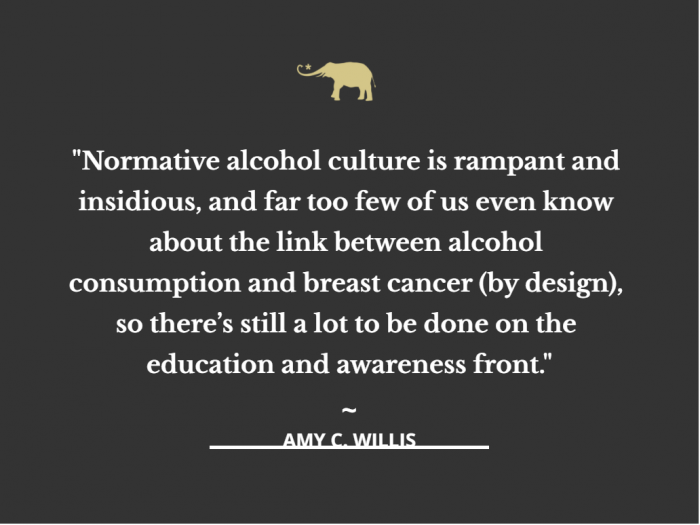Reading that Gwyneth Paltrow’s ‘clean beauty’ regime means she starts every day with a refreshing glass of alkaline water + a spritz of lemon.
(Which makes the alkaline water no longer alkaline & highlights the magnificent level of BS that people will swallow from celebrities) pic.twitter.com/rfpqtx43vc
— James Wong (@Botanygeek) September 9, 2019
While I recognize that—as a sober person and someone who works professionally in the field of sobriety and recovery—I am keenly attuned to the presence of alcohol in our world, I can’t be the only one who’s noticed the steady increase in alcohol creeping into the wellness space.
We are seeing it in a variety of ways, such as events like “Vinyasa and Vino,” beer companies sponsoring events like marathons so their product can be served at the end, and online through the infiltration of women’s wellness influencers, despite alcohol being causally linked to at least seven different types of cancer, including mouth, throat, breast, liver, and colon, the levels of awareness of this cancerous connection seem to vary.
According to one small study conducted in Minnesota in 2019, 92 percent of study participants were aware of the causal link between alcohol and liver cancer while a meager 38 percent of people in the same study knew of the link between alcohol and breast cancer, demonstrating an urgent need for more education and awareness around these real risks.
According to a 2020 study, only one in four women aged 15-44 were aware of the link between alcohol consumption and breast cancer. Given how much misinformation exists on this topic and how additional information and education would be a great service to women’s wellness, women’s wellness influencers seem perfectly positioned to lead the charge on that education.
Yet, instead of speaking about the real risks alcohol poses, many women’s wellness influencers are promoting and urging alcohol consumption amongst their followers, effectively acting as mouthpieces for Big Alcohol and leading to the detriment of the women who follow them.
The multimillion dollar global women’s wellness brand, goop, is a regular offender when it comes to subtly encouraging alcohol consumption while simultaneously promoting so-called wellness. Their social channels feature alcohol in their images, offer cocktail recipes, and even collaborate with alcohol companies in the name of “wellness,” relying on the same tired gendered language and stereotypes.
Compared to nondrinkers, women’s risk of breast cancer (with the understanding that there are lots of variables in the mix) is increased by 15 percent for every three alcoholic drinks consumed per week, with the risk of increasing by 10 percent per additional regular daily drink. That’s a lot of risk, yet we aren’t talking about it.
According to a recent Wired magazine article, “Alcohol is the breast cancer risk that no one wants to talk about,” probably for the same reasons women’s wellness influencers are partnering with booze companies and pocketing some cash along the way.
The allure of partnering with Big Alcohol is real.
Where booze goes, money flows, and in the capitalist, patriarchal, white supremacy world we live in, the push to hustle—especially for women and racialized, disabled, queer women—is extremely real.
What’s also real is the need to not rock the boat too much to be palatable and likeable. Getting on board with booze is the inverse of rocking the boat because alcohol is normal, ubiquitous, and expected.
I genuinely believe that the women who morph into “wellness influencers” do the work they do because they want to support and empower women and to contribute to their wellness in positive ways.
Normative alcohol culture is rampant and insidious, and far too few of us even know about the link between alcohol consumption and breast cancer (by design), so there’s still a lot to be done on the education and awareness front.
That said, our collective common sense and knowledge are that alcohol isn’t great for us. We limit the age of folks who can buy and consume it. We put restrictions around mixing alcohol and driving. We strongly advise against it during pregnancy, and we certainly do an excellent job at judging and shaming those who consume too much. So, there are indicators that alcohol comes with some red flags.
And yet, we continue to see more and more women’s wellness influencers hop on the booze bandwagon for bank.
I think it’s also important to notice the gendered language and marketing ploys used when trying to sell booze to women. It’s steeped in fatphobic, patriarchal, diet culture rhetoric that emphasize the “healthy” aspects of the alcoholic beverage such as being low-carb/sugar/calorie.
The tragic and uncomfortable truth of this is that this sexist language is designed to manipulate women into drinking more, and the reduced calorie count of the alcoholic drink does nothing to reduce the risk of breast cancer.
To be clear, this is not an attack on women’s wellness influencers who partner with alcohol companies.
Given the climate and external pressures, I can understand why these partnerships come to fruition. And instead of criticism, my hope is that this is read as an invitation to think critically and reflectively about the types of partnerships you engage in and if those partnerships are legitimately in service of women’s betterment and wellness.
I can tell you, right now, that any partnership with alcohol companies is, without question, not in service of those goals.
What makes women’s wellness influencers powerful is the inherent trust and knowing that exists between women. The shared experiences of women lends itself to that knowing and trust. It’s candid and relatable and, often, safe.
So when your favorite influencer—the one who never leads you astray on fitness guidance, athleisure, recommendations, and skin care hacks—casually and subtly suggests, via paid ads on Instagram, that you try a new low-sugar, low-cal alcohol brand, you’re sold.
Because why wouldn’t you be? This woman has earned your trust and is deeply committed to health and wellness, so of course everything that she does is in service of that mission.
Except when it’s (unknowingly?) not.
The trust and knowing that exist between a women’s wellness influencer and her community are exploited and capitalized the minute she says “yes” to selling her community poison for her own personal gain.
Given the low levels of awareness around the causal link between alcohol and breast cancer shared above, we can assume that most women—including women’s wellness influencers—just don’t know the facts. Coupled with the need for women to hustle, make money, do what’s popular (booze is popular), I guess I shouldn’t be so surprised.
But I still expect more—and you should too—from those who take up influential space in the wellness sphere.
As women, we are constantly inundated with permissive, encouraging alcohol messages at every turn.
Alcohol is all over social media, in the TV and movies we consume, in books and music, and on billboards. Alcohol is fed to us as a solution for everything, as the ever-powerful elixir that makes every aspect of our lives better.
This is all a function of normative alcohol culture and it’s killing us. Women’s drinking is on the rise, and we are paying the price with our boobs and our lives.
The bottom line is women deserve the truth.
The absolute last thing we need is to be sold lies and poison. We deserve wellness tips and guidance that are actually in service of our collective wellness and health, not suggestions on how to increase our chances of developing breast cancer, diminish our mental health, and add to our stress.
This, in my opinion, is the antithesis of wellness, and we deserve better.












Read 44 comments and reply